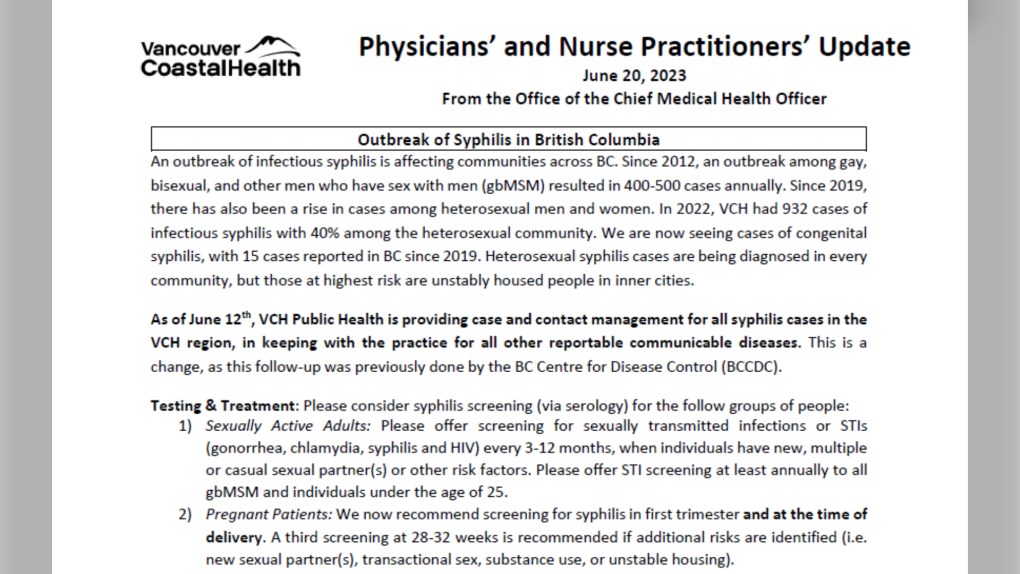B.C. syphilis outbreak grows, more testing recommended

It started more than a decade ago, but a syphilis outbreak in British Columbia has grown even bigger in recent years, now impacting newborn babies and prompting a new testing and contact tracing strategy.
In a bulletin to doctors and nurse practitioners on Wednesday obtained by CTV News, Vancouver Coastal Health urges clinicians to offer annual screening for all sexually active adults under age 25 and for pregnant patients in their first trimester, then again at the time of the delivery.
“Given that syphilis can be asymptomatic or present with a myriad of different signs and symptoms, we recommend physicians have a high clinical suspicion for syphilis and a low threshold for syphilis testing,” reads the memo, noting that penicillin is the first line treatment and is free for syphilis patients in British Columbia.
In 2022, Vancouver Coastal Health recorded 932 cases of syphilis – a dramatic increase from the annual average of between 400 and 500 cases since 2012. Forty per cent of last year's infections were detected in heterosexual patients; before it had been predominantly found in men who have sex with men.
“We’re getting back to some of our important routine public health work now, coming out of the pandemic,” said Dr. Patricia Daly, Chief Medical Health Officer at Vancouver Coastal Health. “I don’t know if the general public or even physicians realize that rates of syphilis have been going up.”
The BC Centre for Disease Control used to handle contact tracing for syphilis and other sexually transmitted infections, but has been transitioning that responsibility to the health authorities whose community health nurses already tracked some, but not all, STIs. Vancouver Coastal Health will now do all contact tracing for syphilis within its jurisdiction, with plans to take over gonorrhea and chlamydia follow-up as well.
The rise in syphilis cases is North America-wide, but Canada in particular is struggling to prevent congenital cases, where babies are born infected and at higher risk of abnormalities and low birthweight.
Daly noted that men who have sex with men, those who are homeless or living in poverty, have been at increased risk of infection in the past but that heterosexual men and women are increasingly infected, prompting the memo. Symptoms can come and go for years. Advanced, untreated cases can lead to complications including infertility, dementia and other serious issues.
Daly says she expects the number of lab-confirmed cases may surge with growing public and health-care practitioner awareness.
“It’s easy to prevent if we can improve testing and follow-up of cases,” she said.

CTVNews.ca Top Stories

B.C. teen with Canada's first human case of avian flu in critical condition, Dr. Bonnie Henry says
The teenager who is sick with the first-ever human case of avian influenza acquired in Canada is in hospital in critical condition, provincial health officer Dr. Bonnie Henry said Tuesday.
Elon Musk and Vivek Ramaswamy will lead new ‘Department of Government Efficiency’ in Trump administration
President-elect Donald Trump announced Tuesday that Elon Musk and Vivek Ramaswamy will lead a new “Department of Government Efficiency” in his second administration.
Here's why thieves may be stealing butter in Canada
The case of the missing butter remains a mystery, but some have ideas on what's behind the unusual crimes.
Former B.C. premier John Horgan dies at 65
Former B.C. premier John Horgan, a popular leader renowned for his affable personality and dedicated public service, has died
Alleged serial killer previously pled guilty to 2018 attack on Waterloo, Ont. bus
The woman accused of killing three people in three days in three Ontario cities also previously admitted to attacking strangers on buses in the Region of Waterloo.
Air Canada to add new routes to U.S., Europe and North Africa in summer 2025
Getting to destinations in the U.S., Europe and North Africa is about to get easier, as Air Canada announced it will be increasing flights to a number of new destinations this summer.
Body found in Montreal park identified as cryptocurrency influencer
The body of a man that was found in a park in the Ahunstic-Cartierville borough last month has been identified as cryptocurrency influencer Kevin Mirshahi.
History in Halifax is slowly being wiped off the map: study
Saint Mary's University archeologist Jonathan Fowler is sounding an alarm with a new study. According to Fowler, the centuries-old architecture that adds to Halifax’s heritage and historic vibe is slowly being wiped away as the city grows.
2-year-old gorilla 'Eyare' dies unexpectedly at Calgary Zoo
A young gorilla at the Calgary Zoo has died. The Wilder Institute/Calgary Zoo announced a member of its western lowland gorilla troop passed away unexpectedly, in a news release Tuesday.

































